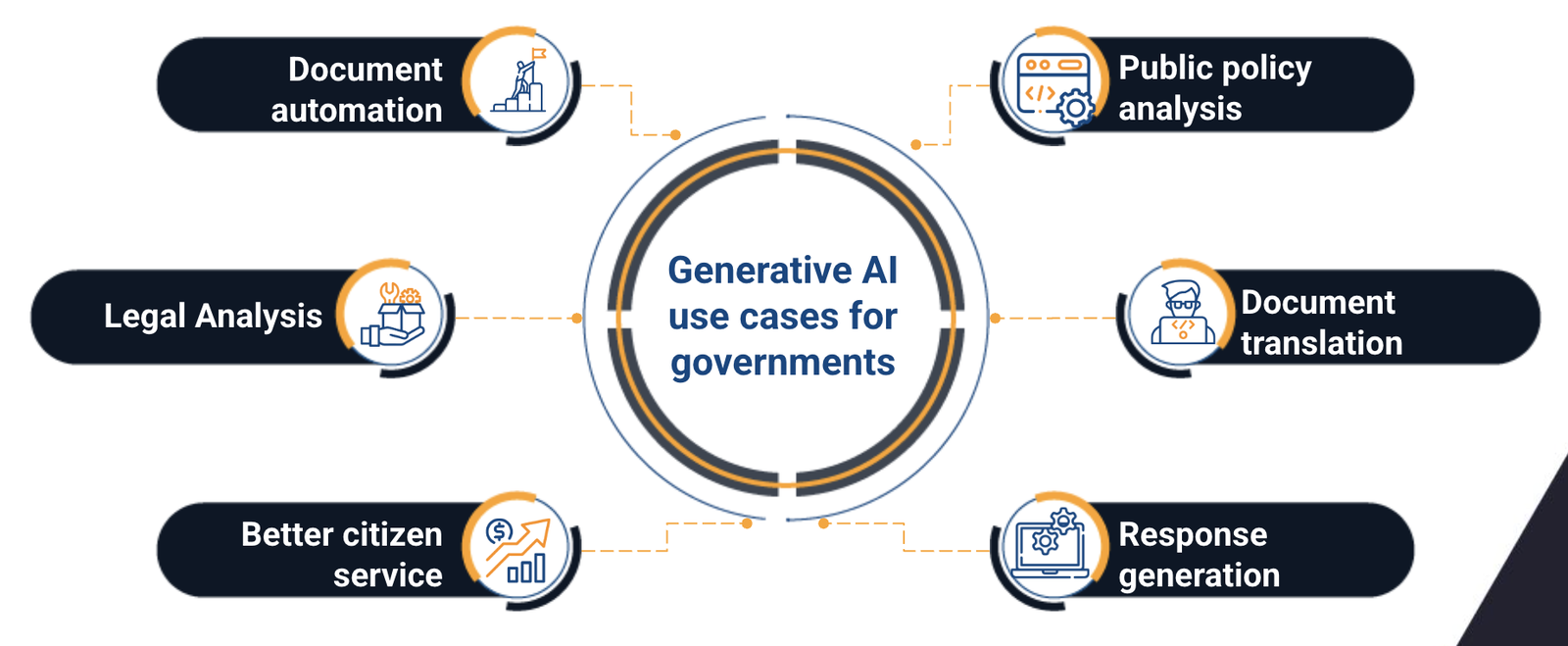
Generative AI use cases for governments and ethical precautions
Table of contents
Quick Access

Generative artificial intelligence is emerging as one of the most disruptive technological tools in the digital transformation of the public sector.
Thanks to its ability to create textual, visual, and structured content based on human instructions, generative AI is positioned as a strategic ally for governments seeking to increase their efficiency, transparency, and responsiveness.
Generative AI use cases for governments go far beyond simple task automation: they include everything from the automatic drafting of regulations, reports, or contracts to the generation of legislative summaries, predictive analytics, and more effective citizen service.
But with these benefits also emerge significant ethical challenges that must be addressed with governance, accountability, and oversight.

Generative AI use cases for governments
Document automation and legal analysis
One of the main use cases for generative AI in the government sector is automated document creation. Governments at different levels—municipal, state, and national—manage an enormous amount of documentation in areas such as contracts, tenders, technical reports, laws, and regulations.
Generative AI allows drafts of official documents to be drafted in a matter of minutes, helping officials save time, reduce human errors, and standardize legal or administrative language.
For example, in public procurement processes, AI can generate standard contracts based on local regulations and automatically adapt them to each new process. In legislative settings, it can summarize bills or translate them into more accessible language for citizens.
Improving citizen service and generating automated responses
Governments also face a high volume of citizen inquiries. With generative AI, it's possible to deploy virtual assistants that answer complex questions using natural, personalized language.
Unlike traditional chatbots, these models can adapt to the context and offer more comprehensive answers, in addition to generating responses via email or on citizen portals from intelligent templates.
This significantly improves the citizen experience, speeds up service, and allows human teams to focus on more complex cases.

Public policy analysis and scenario simulation
Generative AI can also support public institutions in analyzing large volumes of data to prepare reports, identify patterns, or generate predictive models on the impact of certain policies.
For example, by feeding the model with historical data on mobility, health, or education, scenarios can be generated that help predict the outcomes of a policy before implementing it.
This enables data- and evidence-based decision-making, one of the main aspirations of modern governments.

Multilingual translation and accessibility
In linguistically diverse countries, generative AI facilitates the translation of official documents into multiple languagess or dialects, allowing greater access to public information for minority communities.
In addition, it can generate simplified versions of complex texts, making laws or regulations easier for the general population to understand.
Ethical risks of using generative AI in the public sector
Despite its many benefits, the use of generative AI for governments entails significant ethical challenges. According to Capitol Technology University, one of the greatest risks is bias and discrimination.
AI systems are trained with massive amounts of data, much of which contains social biases. This can lead models to perpetuate or even amplify prejudices in sensitive areas such as justice, resource allocation, or public procurement.
For example, if an AI model is trained with historical resource allocation data in a certain region and this reflects biased decisions from the past, the AI could reproduce those biases in its future recommendations.
Another critical point is the lack of transparency. Many AI models operate as “black boxes,” making it difficult to understand how they reached certain conclusions or decisions. In critical areas such as health, justice, or security, this can create trust issues and hinder accountability.
Capitol Technology University also warns about the proliferation of AI-powered fake news and misinformation. Technologies such as deepfakes can be used to generate misleading content, with serious implications for political stability and public trust.
Governance: Key to the responsible use of AI
Faced with these challenges, it is vital to implement strong governance frameworks. IBM defines AI governance as the set of policies, processes, roles, and tools that enable organizations to oversee and control the lifecycle of their artificial intelligence systems.
A good governance program in the public sector should include:
- Clear definition of the roles and responsibilities of those who develop, train, and oversee AI models.
- Ongoing training for public officials involved in the use of AI.
- Established processes to monitor and audit the results of AI systems.
- Traceability and explainability tools to ensure transparency in automated decision-making.
Adopting these principles not only reduces risks but also improves citizen confidence in the State's use of advanced technologies.

Benefits of generative AI for governments
With ethical and responsible implementation, the benefits of generative AI for governments are numerous:
- Greater efficiency in administrative processes.
- Reduction in operating costs.
- Improved quality and speed of citizen service.
- Evidence-based decision-making and advanced data analysis.
- Social inclusion through machine translation and accessibility.
All of this translates into more agile, transparent, and citizen-centered institutions.
Rootstack: A trusted partner in AI solutions for governments
At Rootstack, we have experience developing and implementing artificial intelligence solutions tailored to the needs of the public sector. From virtual assistants to document automation tools and predictive analytics, we help governments modernize their operations in an ethical, secure, and efficient manner.
Our approach combines cutting-edge technology with solid governance and accountability principles, ensuring reliable results aligned with institutional values. If your institution is looking to take the next step in digital transformation, contact us.
At Rootstack, we're ready to help!
Related blogs

Banking software development company | Rootstack

Firewall solutions for IoT: Protect your business network

IoT Authentication: Key Methods for Protecting Devices

IoT penetration testing: Why it's crucial and necessary

Main IoT security risks and how to mitigate them
